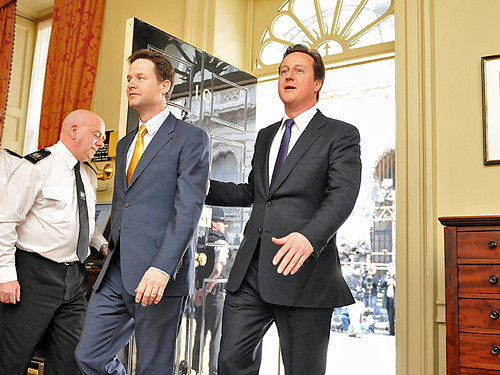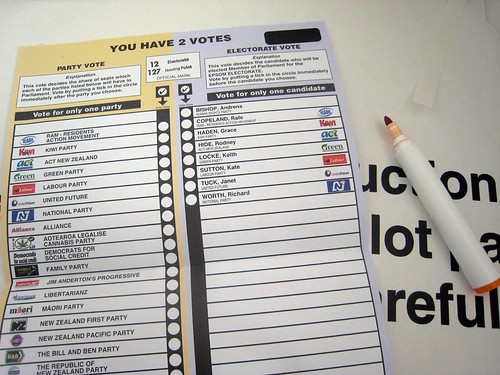 The UK political climate has greatly changed since the general election and the advent of coalition government, and old certainties and models no longer work. Bryan Gould argues that the New Zealand experience of how governance changes since adopting proportional representation in 1996 offers some important parallels and lessons for Britain.
The UK political climate has greatly changed since the general election and the advent of coalition government, and old certainties and models no longer work. Bryan Gould argues that the New Zealand experience of how governance changes since adopting proportional representation in 1996 offers some important parallels and lessons for Britain.
The general election of 2010 was the most complex and fascinating of modern times. In one sense, it was the election that no one won. In another, it ushered in what may be a new era – marked by of coalition government; a new electoral systems, perhaps even proportional representation; and the final renunciation of a world role for Britain.
For Labour, it was undeniably a defeat, but on a smaller scale than might have been expected. It should certainly lead to a clear-out of a leadership that led the party down a cul-de-sac and wasted the greatest opportunity offered to a potentially reforming government since the end of the Second World War. The shocking invasion of Iraq, the obeisance to the excesses of the City, the tolerance of widening and damaging inequality in British society, the complicity in torture, were betrayals of principle that were not easily forgiven. A party leadership that chose to identify itself by claiming “Newness” cannot complain if the passage of time exacts its toll. Nothing is now more past its sell-by date than “New” Labour.

In seeking a way forward, Labour could do worse than look to the example of the Labour Party in New Zealand. Following a disastrous spell presiding over extreme “free market” policies, NZ Labour endured nine years in the wilderness before returned to power – not so much by turning back the policy clock – but by restoring the voters’ faith in its fundamental values and their relevance to modern circumstances.
For the Conservatives, the result was bitter-sweet. David Cameron is in Downing Street and heads a government in which Tories hold the great offices of state. But his failure to win a Commons majority was a fatal blow to any belief that Britain was about to return to its Conservative roots. If the Tories could not command a majority after thirteen years of a discredited Labour government, headed by a deeply unpopular leader and off the back of the most severe recession in seventy-five years, it is hard to see the new Tory-led government as anything more than a default option.
Changing electoral systems
For the Liberal Democrats, these are heady days. However, they may not last long. The elevation of Nick Clegg to the role of kingmaker was a function of the failure of the two larger parties to secure a majority, rather than because reflecting any sudden transformation of the Liberal Democrats’ electoral fortunes.
The Lib Dems, however, will be excited at the prospect of achieving their central goal – electoral reform, which they have persuaded themselves will transform their prospects. Yet it is unclear if the coalition commitment to hold a referendum on the Alternative Vote will deliver that to them. Quite apart from the need to secure the legislation for a referendum, the Alternative Vote is not the most obvious or effective form of voting reform, and does not give proportional representation. There is also no guarantee that the voters would support it. Even if PR was somehow to be achieved, the consequences for the Lib Dems may not be quite what they expect.

New Zealand changed from first-past-the-post to a proportional system fourteen years ago. Its experience is that voters have a surprising ability to maintain the fundamental choice between a left-of-centre government and a right-of-centre government, even under a proportional system. In other words, PR may mean that every vote gained because the Liberal Democrats are newly seen as serious contenders for power might be matched by the loss of a Lib Dem vote that had previously been cast as a form of protest.
This is not to say that there is not a good case for electoral reform. The New Zealand experience is again informative. The abandonment of single-party government has meant that ministers are constantly engaged in a process of negotiation. Each piece of legislation, each major policy decision, has to be preceded by discussions to ensure that a parliamentary majority exists to support that particular measure.
Curiously, this does not seem to have meant that the government’s programme is hopelessly delayed or frustrated. It has meant that legislation cannot be introduced until the necessary deals have been done. But the corollary has been that the passage of more thoroughly prepared and carefully drafted legislation is smoother and takes less time from when it starts. An even bigger plus point is that the legislation must always appeal to a wider constituency than that represented by just one party. So it is often more soundly based and widely supported, with more of its contentious rough edges rounded off.
The psychological change is also important. There is less of Quintin Hogg’s “elective dictatorship” in New Zealand under PR. There is less obsession with doing down the opposition parties at every opportunity, since their support might be needed on the next item in the government’s programme. There is a greater understanding of the value of broad public support and keeping in touch with public opinion.
Britain in the world
Perhaps the most significant long-term consequence of the 2010 general election, however, is that it may herald the demise of that sense that in electing a British government we are also putting in place an administration that will play a significant role in running the world. The oft-repeated need for “strong” government is in many ways a hangover from an imperial past when British education, public service and government were directed at providing able administrators to run large parts of the globe. Certainty and authority in decision-making were everything.
But today, Britain’s role is as a medium-sized country which needs to focus on creating an effective, inclusive and prosperous democracy at home, rather than on wasting resources and energy on pretensions to a world role that is now beyond us. Other comparable countries have done very well without our particular obsession with “strong” (for which read “tribal”) single-party government and a winner-takes-all electoral system. A sustained experience of coalition government and a more representative Parliament, with all that that means in terms of inclusiveness, responsiveness and taking the wider view, might help us to embed the same realisation.




